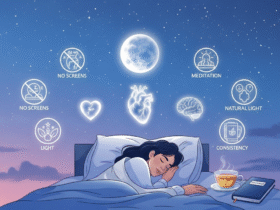Hormonal imbalance is a common issue for many women, leading to symptoms like mood swings, weight changes, and hot flashes. Hormones are chemical messengers that play a crucial role in regulating a variety of bodily functions, from metabolism to mood to reproductive health. These imbalances are often experienced during key life stages such as puberty, menstruation, pregnancy, and menopause. However, stress, poor diet, and environmental factors can also contribute to hormonal fluctuations, affecting overall well-being.
What Causes Hormonal Imbalance in Women?
Before addressing how to balance your hormones naturally, it’s important to understand what causes hormonal imbalances. Knowing the factors at play can help you take the correct steps to rectify the issue.
Internal Factors Influencing Hormonal Health
Hormonal levels naturally fluctuate during puberty, pregnancy, and menopause, causing significant changes in the body. These periods of life involve major shifts that can alter your hormonal balance.
Stress is a major contributor to hormonal imbalances. When you’re stressed, your body releases cortisol, the “stress hormone.” Excess cortisol can disrupt the production of other hormones like estrogen and progesterone.
Chronic stress can lead to an overproduction of cortisol, creating an imbalance in your hormonal system.
Factors Contributing to Hormonal Imbalance
While hormonal fluctuations during life stages are natural, there are several other factors that can cause hormonal imbalances. These include lifestyle choices, environmental factors, and underlying health conditions.
Diet and Lifestyle
A poor diet, high in processed foods and sugar, can significantly affect your hormone levels. Nutrient deficiencies, particularly in vitamins and minerals essential for hormone production, can lead to imbalances. Moreover, insufficient sleep and poor liver health can also contribute to hormonal disruption.
Symptoms of Hormonal Imbalance
Hormonal imbalances manifest in a variety of physical, emotional, and mental symptoms. It’s crucial to identify these symptoms early to address the underlying causes before the issue becomes more severe.
Physical Symptoms of Hormonal Imbalance
Some common physical signs of hormonal imbalance in women include:
- Irregular Periods: Unpredictable or missed periods are often a sign of hormonal imbalances.
- Weight Gain: Unexplained weight gain, especially around the abdomen, can indicate imbalances.
- Fatigue: Feeling constantly tired, even after a full night’s sleep, can be a symptom of hormonal disruption.
- Mood Swings and Anxiety: Hormonal imbalances can lead to drastic mood swings or feelings of anxiety.
- Hair Loss: Thinning or excessive hair shedding may occur due to hormonal fluctuations.
- Skin Issues: Acne, dry skin, or other skin changes can also be related to hormonal imbalance.
Emotional and Mental Health Symptoms
Hormonal imbalances can also affect emotional and mental health. Symptoms may include:
- Overwhelmed Feelings: A sense of being unable to cope with stress or daily tasks.
- Irritability: A short temper or heightened irritability can result from hormonal fluctuations.
- Low Libido: A decrease in sexual desire or arousal can be linked to hormonal changes.
Natural Remedies for Balancing Hormones

Now that we know what causes hormonal imbalances and how they manifest, let’s explore some effective, natural remedies that can help restore balance to your hormones.
1. Stress Management
Since stress is a key player in disrupting hormonal balance, managing stress is crucial. Techniques such as deep breathing exercises, meditation, yoga, and mindfulness can help reduce cortisol levels, leading to a more balanced hormonal system.
2. Dietary Changes
Eating a well-balanced diet can have a profound effect on your hormonal health. Incorporate more nutrient-dense foods such as:
- Leafy Greens: High in magnesium, which helps regulate hormonal functions.
- Healthy Fats: Omega-3 fatty acids from sources like fish, walnuts, and flaxseeds help maintain hormone balance.
- Protein: Consuming adequate protein helps the body produce hormones and maintain energy levels.
Additionally, avoid overindulging in processed foods and sugars, as these can disrupt hormone production and increase inflammation.
3. Exercise Regularly
Moderate physical activity can help regulate hormone levels by improving blood circulation, reducing stress, and enhancing overall health. Regular exercise, such as brisk walking, swimming, or yoga, can boost your immune system, reduce cortisol levels, and support hormone balance.
4. Get Adequate Sleep
Sleep is essential for maintaining a healthy hormonal system. Aim for 7 to 9 hours of quality sleep each night. Establish a relaxing bedtime routine, such as reading a book or practicing deep breathing, to help prepare your body for rest. Good sleep helps regulate cortisol and supports the production of growth hormone and reproductive hormones.
5. Use Herbs and Supplements
Certain herbs and supplements can support hormonal balance. Consider adding the following to your routine:
Vitamin D: Crucial for hormonal balance, especially during the winter months when sun exposure is limited.
Ashwagandha: An adaptogenic herb that helps regulate cortisol and reduce stress.
Maca Root: Known to balance estrogen levels and boost energy.
Chaste Tree Berry: A herb that can help regulate progesterone levels.
How Diet Plays a Crucial Role in Hormonal Health
Hormonal balance plays a crucial role in a woman’s overall health. From mood swings to weight gain, an imbalance in hormones can affect various aspects of life. Thankfully, there are natural ways to help restore hormonal balance, with diet and lifestyle changes being some of the most effective strategies. Below are practical steps to help you maintain or restore balance in your hormones through nutrition, exercise, and stress management.
Diet: A Powerful Tool for Hormonal Balance
Your diet has a significant impact on your hormone health. The foods you consume can help regulate estrogen, stabilize blood sugar levels, and boost thyroid function. Here’s how you can use food to support your hormonal health:
Healthy Fats for Hormonal Production
Healthy fats are essential for hormone production. Fats from avocados, olive oil, and nuts help your body produce important hormones like estrogen and progesterone. Including these fats in your diet can help support balanced hormone levels.
Detoxifying Estrogen with Cruciferous Vegetables
Cruciferous vegetables, such as broccoli, cauliflower, and brussels sprouts, are excellent for detoxifying excess estrogen in the body. Regular consumption of these vegetables can help maintain hormonal balance by supporting the body’s natural detoxification processes.
Fiber and Protein for Blood Sugar Regulation
Increasing the fiber content in your diet is important for regulating blood sugar levels, which in turn helps stabilize hormones. Foods like whole grains, legumes, and vegetables are high in fiber and can help keep blood sugar levels steady. Additionally, protein-rich foods like chicken, turkey, tofu, and fish are essential for stabilizing blood sugar and supporting hormone regulation.
Exercise: A Key to Balanced Hormones
Exercise is another powerful tool in maintaining hormonal balance. Not only does it improve physical health, but it also supports the endocrine system, helping to regulate hormones like cortisol, insulin, and thyroid hormones.
Exercise to Normalize Cortisol
Regular exercise helps normalize cortisol, the stress hormone. Activities like yoga, walking, and strength training are especially effective at reducing cortisol levels, promoting relaxation, and improving mood. These exercises also encourage the production of endorphins, which are your brain’s natural feel-good chemicals.
Strength Training for Thyroid Health
Strength training exercises are beneficial for improving thyroid function and increasing metabolic rate. Regular strength training helps keep thyroid hormones balanced, which is essential for maintaining energy levels and overall vitality.
Yoga for Stress Relief
Yoga is not only great for flexibility and body awareness, but it also has a calming effect on the nervous system. Practicing yoga regularly can reduce stress, promote relaxation, and support balanced hormone levels.
Stress Management: The Secret to Hormonal Health
Chronic stress is one of the biggest disruptors of hormonal balance. When stressed, the body produces excess cortisol, which can lead to imbalances in other hormones, including estrogen, progesterone, and thyroid hormones. Managing stress is essential for maintaining hormonal health.
The Impact of Chronic Stress on Hormones
Chronic stress has a widespread impact on your hormones, often leading to irregularities in the production and functioning of important hormones. Prolonged exposure to high cortisol levels can lead to mood swings, weight gain, and fatigue.
Effective Stress-Relief Techniques
To restore hormonal balance, it’s important to incorporate stress-relief techniques into your daily routine. Practices such as deep breathing, meditation, and mindfulness can help normalize cortisol levels and calm the nervous system. Spending time in nature or engaging in creative activities, such as journaling or painting, can also help reduce stress.
Creating a Stress-Free Environment
Creating a supportive environment is equally important in managing stress. Surround yourself with positive, motivating people who support your emotional well-being. This environment will help you maintain balance between your body and mind, which is essential for hormonal health.
| Food | Key Nutrients | Hormonal Health Benefits |
|---|---|---|
| Avocados | Healthy fats (monounsaturated fats), fiber | Supports hormone production, improves estrogen and progesterone levels |
| Broccoli | Vitamin C, fiber, sulforaphane | Detoxifies excess estrogen, promotes liver health |
| Flaxseeds | Omega-3 fatty acids, lignans | Helps balance estrogen levels, supports thyroid function |
| Salmon | Omega-3 fatty acids, protein | Reduces inflammation, supports hormone production and regulation |
| Spinach | Magnesium, Vitamin C, iron | Supports thyroid health, balances cortisol levels, reduces PMS symptoms |
| Chia Seeds | Omega-3 fatty acids, fiber, protein | Promotes healthy fat metabolism, balances blood sugar, and reduces inflammation |
| Eggs | Protein, Vitamin D, omega-3s | Supports adrenal function and hormone regulation |
| Nuts (almonds, walnuts) | Healthy fats, Vitamin E, magnesium | Supports estrogen metabolism, balances blood sugar levels |
Herbal Remedies and Supplements for Hormonal Health
Nature has provided us with a variety of powerful herbs and supplements that can help regulate hormones and improve overall well-being. Many of these herbs have been used for centuries to support hormonal health. Let’s explore some of the finest natural remedies for balancing hormones.
Ashwagandha: The Stress Reliever Adaptogen
Ashwagandha is an adaptogen, meaning it helps the body adapt to stress. Prolonged stress leads to the production of excessive amounts of cortisol, which can negatively affect hormonal balance. Ashwagandha helps reduce cortisol levels, promoting hormonal equilibrium.
Additionally, it supports thyroid health and reproductive health, making it an excellent option for women looking to balance hormones naturally. By reducing stress, Ashwagandha can help regulate hormones and improve overall vitality.
Vitex (Chaste Tree Berry): Bringing Hormones into Proper Balance
Vitex, also known as Chaste Tree Berry, is one of the most well-known herbs for balancing hormones. It works by acting on the pituitary gland, stimulating the production of progesterone, which is essential for regulating the menstrual cycle.
Vitex is particularly beneficial for women dealing with PMS (Premenstrual Syndrome) or irregular periods. It helps alleviate common symptoms of PMS such as irritability, bloating, and fatigue. Additionally, it can help manage estrogen dominance, a condition associated with disorders like fibroids and endometriosis.
Maca Root: Maintaining Estrogen Levels and Energy
Maca root is another powerful herb that supports hormonal balance, particularly in relation to estrogen and testosterone. For women experiencing menopause, maca root is an excellent alternative to help manage the symptoms of estrogen loss, including hot flashes and night sweats.
Aside from its effects on hormone levels, maca root also boosts energy levels and enhances mood. If you’re struggling with fatigue caused by hormonal imbalances, maca root can provide a natural energy boost and promote a sense of well-being.
Detoxification: Supporting Natural Hormonal Activity
A healthy liver is essential for breaking down and eliminating excess hormones, particularly estrogen. If the liver is not functioning properly, excess hormones can accumulate in the body, disrupting the balance of your endocrine system.
Detox Foods for Hormonal Health
Incorporating detox-supporting foods into your diet can aid in liver function and overall hormonal health. Cruciferous vegetables like broccoli, Brussels sprouts, and cauliflower are particularly helpful, as they contain compounds that assist in detoxifying excess estrogen and supporting the liver’s natural detoxification process.
These foods support the body’s detoxification pathways, which is crucial for maintaining hormonal balance and overall well-being.
Detox Herbs
In addition to food, certain herbs can enhance detoxification and support liver function. Dandelion root is a powerful herb that helps the liver remove toxins from the body. Curcumin, the active compound in turmeric, is another excellent herb that supports liver health, as it has both anti-inflammatory and antioxidant properties.
By incorporating these herbs into your diet or using them in supplements, you can support your body’s natural detoxification processes and promote hormonal balance.
Sleep: The Silent Hero of Hormonal Health
Quality sleep is essential for maintaining a balanced hormonal system, yet it is often underestimated. Sleep deprivation does not just cause tiredness; it can significantly interfere with the production of key hormones, such as cortisol, insulin, and melatonin. Poor sleep also disrupts the regulation of appetite hormones, which can lead to weight gain or unhealthy cravings.
How to Improve Sleep for Hormonal Health
To optimize sleep and promote hormonal balance, the following habits are essential:
- Establish a Consistent Sleep Schedule: Try to go to bed and wake up at the same time every day. Consistency in your sleep routine helps regulate your body’s internal clock and supports hormone production.
- Limit Screen Time Before Bed: The blue light emitted from phones, tablets, and computers can disrupt melatonin production, a hormone that helps you sleep. Aim to reduce screen time at least an hour before bedtime.
- Create a Comfortable Sleep Environment: Ensure that your bedroom is cool, dark, and quiet. These conditions promote a restful night of sleep, which is vital for hormone balance.
- Relax Before Bed: Take a few deep breaths, meditate, or read a book before bed. Relaxation helps signal to your body that it’s time to wind down and prepare for sleep.
By prioritizing quality sleep, you allow your body to rest, recuperate, and maintain the delicate balance of hormones that regulate everything from metabolism to mood.
Maintain a Healthy Weight for Hormonal Balance
Maintaining a healthy weight is crucial for optimal hormonal health. Both overweight and underweight conditions can lead to hormonal imbalances.
- Overweight and Hormonal Disruption: Excess body fat can lead to increased estrogen levels, disrupting the balance of hormones in the body. This can contribute to conditions like estrogen dominance and other hormonal disorders.
- Underweight and Hormonal Imbalance: On the other hand, being underweight can also cause hormonal imbalances. Without enough body fat, your body may not be able to produce adequate levels of hormones, including estrogen and progesterone.
Insulin and Hormonal Health
Insulin regulation plays a key role in maintaining hormonal balance. Improper management of insulin, often due to poor diet and lack of exercise, can lead to insulin resistance, which in turn disrupts the balance of other hormones like testosterone and estrogen.
How to Manage Insulin for Hormonal Balance
- Balanced Diet: A diet that includes a variety of whole foods, rich in fiber, healthy fats, and lean proteins, helps regulate blood sugar levels and promotes insulin sensitivity.
- Regular Exercise: Physical activity is essential for managing insulin levels. Regular exercise helps improve insulin sensitivity, making it easier for your body to maintain proper hormone levels.
By focusing on maintaining a healthy weight and ensuring proper insulin regulation through diet and exercise, you support your body’s ability to produce and balance essential hormones.
Natural Supplements to Balance Hormones
| Herb/Supplement | Main Benefits | Best For |
|---|---|---|
| Ashwagandha | Reduces cortisol, supports thyroid health | Stress management, thyroid health, reproductive health |
| Vitex (Chaste Tree Berry) | Balances estrogen and progesterone, supports menstrual cycle | PMS, irregular periods, estrogen dominance |
| Maca Root | Balances estrogen and testosterone, boosts energy | Menopause symptoms, energy, mood regulation |
| Dandelion Root | Supports liver detox, reduces excess estrogen | Liver detoxification, estrogen balance |
| Turmeric (Curcumin) | Anti-inflammatory, supports liver function | Inflammation, liver health, hormonal balanc |
Conclusion
To sum up, hormonal balance is not always a complex process. To facilitate your body to be hormonally healthy, simply pay attention to the area of diet, exercise, stress, adequate sleep, as well as herbs. Tiny, green tweaks to your everyday lifestyle have the potential to make an insurmountable difference in the way you live, both physiologically and emotionally.
It has to be kept in mind that balance is a process. Through the correct measures now, you will be in a better position to deal with the hormonal changes associated with the various changes in life. The thing is, however, regardless of whether you are suffering through PMS or menopause or you simply wish to keep hormonal harmony, the ability to control your health is in yours.















Leave a Reply